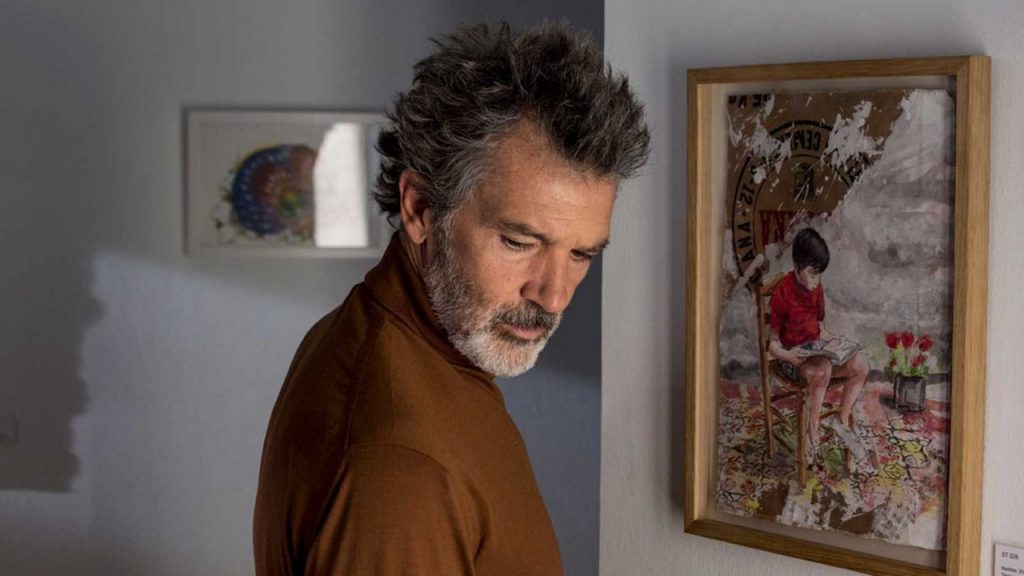I’ll start this review by voicing one of my biggest film related shames: I am not a fan of Pedro Almodovar’s films.
I find myself visiting each new Almodovar in the hope that this will be the one to change my mind. I can see that he is clearly a brilliant director, with excellent writing that provides the text for some wonderful performances, but no matter how much he harmonises his orchestra, it always sounds out of tune and unappealing to my ear. It pains me to feel this way, because I hear people talk about Almodovar’s work (like Almodovar megafan Alonso Duralde who interviewed the director for The Wrap in this essential read) and I wish I saw what they saw. I wish I could embrace Almodovar’s celebration of life, his ode to women, his vibrancy and vitality that apparently thrives within his films.
But, up until now, I just haven’t been able to.
Then I saw Pain and Glory and everything changed.
The plot for this one is deceptively simple – an ageing director, Salvador Mallo (a career best performance from Antonio Banderas), reflects on his life, his work, his mother, and his sexuality. That’s about it.
No, I shouldn’t be so dismissive. There is so much more to Pain and Glory that I cannot wait to immerse myself in this narrative again. Almodovar weaves in the narrative of young Salvador (Asier Flores) growing up with his mother Jacinta (Penelope Cruz, another Almodovar staple), learning how to grow in a life of poverty, and reflects on this upbringing by showing the adult Salvador being confronted with an ageing, ailing body, along with a celebrated filmography that haunts him with memories of a fractured relationship with a past collaborator (Asier Etxeandia).
Every layer of this film feels measured and assured, like every moment has been given great consideration and mulled over minute after minute until it feels just right. As with much of Almodovar’s work, there is a deeply personal aspect to Pain and Glory, with a lot of the film playing like an ode to his mother, an atonement to his own body of work, and a reconciliation with himself. Banderas’ performance reflects this intimacy so wonderfully, so tenderly, with such deep authenticity that you can understand why the two artists both enjoy working together, and why there was a two decade gap between projects (Banderas didn’t work with Almodovar again after 1990’s Tie Me Up! Tie Me Down! reuniting in 2011 for The Skin I Live In). This is much a love letter from Almodovar to his own life as it is an apology from both Banderas and Almodovar to each other.
In this way, Pain and Glory feels like a soufflé: it’s a carefully made treat, one that took a long while to create, with every aspect of its delicate core in jeopardy of crumbling under the inherently temperamental nature of two artists working together, but now it’s complete, one can only admire the dedication, the care, the adoration and admiration that brought it to completion.
Yet, what impresses me the most about Pain and Glory is the way it sits comfortably by itself as a film that doesn’t hinge on having a deep knowledge, understanding, or appreciation of Almodovar’s work. Sure, I’m aware of Almodovar’s life because I’m a student of cinema, but for those who aren’t, there is still a lot to gain and appreciate here.
I was particularly taken by the gentle warmth that the moments with Cruz’s mother were presented. While Banderas and Cruz don’t share a scene together, you can’t help but feel this deep connection between the two. This is the sign of a true master of cinema, one who manages to create a fold where you are certain one was not possible, and in turn, he ends up weaving an experience that moves you completely. It’s this pure love for his mother, the care and affection that has built up over a lifetime that is so openly explored here, that has me eager to revisit his previous films and see what I had long missed on previous viewings. I feel I’m in for a wonderful experience, and it’s mostly because I feel like Almodovar has welcomed everyone and all with this film. He’s inviting us into his therapists office to hear his stories, and he’s asking us to empathise with life, love, living, and the struggles and joys that come with all of this.
I found myself joyously moved at the end of Pain and Glory. It’s a defiant ending, one that says that this is a filmmaker who is not ready to hang up his hat and retire from storytelling, one who knows that he might be revisiting the same themes, but is doing so because those themes are worth remembering and exploring. After all, should we not be reminded of what it means to love? To love our mothers, or the feeling of our first love, or maybe the moment where you learned to love yourself and accept who you are as a person. Or even the feeling of loving your own work and appreciating its own brilliance, no matter what that work is.
Just like life, Pain and Glory is a patient film, it quietly sits in wait, encouraging you to create new memories by revisiting your own old memories. It encourages you to reflect on your life and see where the nudges and bumps occurred that helped create you into the person you are. And, for me, it encouraged me to reflect on a filmmaker who I’d long struggled to connect with and to see his stories from a different light.
Director: Pedro Almodovar
Cast: Antonio Banderas, Penelope Cruz, Asier Flores
Writer: Pedro Almodovar



